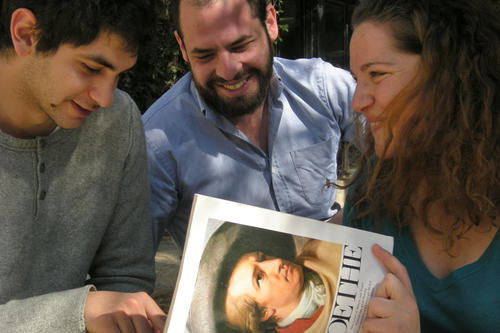Goethe in Jerusalem
Freie Universität Teams Up With the Hebrew University of Jerusalem to Organize a Lecture Series on German Literature
Feb 19, 2014
Discovering German classics: Chili Atia, Tzvi Schoenberg, and Tamar Gutfeld (from left) are three students of the Hebrew University of Jerusalem, who are taking part in the lecture series on German literature.
Image Credit: Karin Neuburger
The Hebrew University of Jerusalem is one of the world’s top universities, and it has a close connection with German history. When it was founded in 1925, numerous German-speaking scholars and scientists belonged to the Board of Governors, including such prominent intellectuals as Albert Einstein, Martin Buber, and Sigmund Freud. German was the language of instruction. That changed after World War II and the Holocaust, when Hebrew replaced German as the scholarly language.
In 1973 it was decided that a chair of German language and literature would be established at the Hebrew University. During the second half of the 1970s, the university continued its efforts to expand the field of German language and literature at the institutional level, inviting scholars to speak at the university as guests. Hans Mayer spoke about Walter Benjamin, and Arnold Zweig gave a talk about Sigmund Freud. Since 1990, the Franz Rosenzweig Minerva Center for German-Jewish Literature and Cultural History has been an important academic center focusing on the history of German-Jewish culture and literature. The Center for German Studies at the Hebrew University of Jerusalem, established in 2007 and supported by the German Academic Exchange Service (DAAD), is another important site of studies of the cultural, political, and social development of the Federal Republic of Germany.
To give the field of German language and literature new drive, scholars from the Hebrew University of Jerusalem and Freie Universität Berlin have now designed a two-semester lecture series in which literature scholars present important authors and works and discuss them with students in a subsequent compact seminar. “Students in Israel are very interested in German culture,” says Susanne Zepp, who is both a professor at Freie Universität and the deputy to the director of the Simon Dubnow Institute for Jewish History and Culture at the University of Leipzig. “The Franz Rosenzweig Center at the Hebrew University is one of the liveliest sites of dialogue and exchange between Israel and Germany. The important work being done by the DAAD Center for German Studies is also leading to a new perception of the importance of the German language, and not just in the humanities,” Zepp says.
The lecture series, which is receiving funding from the Axel Springer Stiftung, was formally initiated at the Hebrew University on February 19, 2014. Professor Hans-Jürgen Schings, an expert on the literature of the Enlightenment and Weimar Classicism, gave the opening address. Schings, who is from Freie Universität Berlin, spoke about Johann Wolfgang von Goethe’s Faust. Invited attendees included not only the presidents of the two universities, Menachem Ben-Sasson and Peter-André Alt, but also the Ambassador of the Federal Republic of Germany in Israel, Andreas Michaelis.
The summer semester portion of the lecture series will feature talks on Thomas Mann and Franz Kafka, but also contemporary authors, such as Christa Wolf, Elfriede Jelinek, and Herta Müller. The next semester, the winter semester, will involve texts from earlier eras, beginning with the literature of Minnesang. The lecture series was first conceived by Susanne Zepp, a professor of Romance languages and literatures, together with Anne Fleig, a professor of German language and literature, and Joachim Küpper, a professor of comparative literature at Freie Universität Berlin, who worked closely with their colleagues in Jerusalem, Professor Yoav Rinon, head of the School of Literatures, and Professor Reuven Amitai, Dean of the Faculty of Humanities. The series also involves the interdisciplinary DAAD Center for German Studies and the Franz Rosenzweig Minerva Center for German-Jewish Literature and Cultural History. The long-term aim of the lecture series is to help further the development of German language and literature as a university discipline.
The Hebrew University of Jerusalem and Freie Universität Berlin are cooperating within the scope of a strategic partnership that encompasses numerous exchange programs and joint research projects in the humanities and the sciences. More than 60 scholars and scientists from both universities are currently working together. The new initiative offers further proof of the dynamic drive behind this partnership and attests to what can be accomplished through working together, as both university presidents point out.
The roots of this partnership lie in the two institutions’ history. Freie Universität Berlin was founded in 1948 by students, scholars, and scientists who wished to learn, teach, and do research in an environment free of political influence. The young university quickly made connections with scholarly, academic, and research institutions and figures in Germany, elsewhere in Europe, and throughout the world. This meant that Freie Universität was also an important destination for those returning to Germany after the war: Ernst Fraenkel, for example, was appointed to the newly established chair in “Political Science, Theory and Comparative History of Political Systems of Government” at Freie Universität in 1953, a position in which he played a major role in the development of this discipline. Things will have come full circle when, next year, the Franz Rosenzweig Center hosts a joint conference between the Hebrew University of Jerusalem and the Dahlem Humanities Center at Freie Universität on Ernst Fraenkel’s work.
Zepp is convinced that the lecture series on German literature in Jerusalem will provide important new drive in the close cooperative relationship between Freie Universität and the Hebrew University of Jerusalem. “And maybe there will be a chair of Hebrew literature in Berlin someday,” she says. That would be the next project, in that case.
Further Information
This text originally appeared in German on February 22, 2014, in the Tagesspiegel newspaper supplement published by Freie Universität.
Concluding Event
- Herta Müller in Jerusalem
Final Event of Joint Lecture Series of Freie Universität Berlin and Hebrew University of Jerusalem on German Literature on April 29

